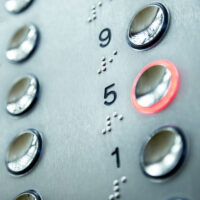Res Ipsa Loquitur Once More Raised in New York City Elevator Accident

Res Ipsa Loquitur is a legal doctrine that is sometimes used to hold a defendant liable for a personal injury. Translated from the Latin, the phrase means, “the thing speaks for itself.” Sometimes an accident occurs, and you cannot prove how it happened, but you know that it wouldn’t have happened unless somebody was negligent. In these situations, the doctrine of res ipsa loquitur can be very helpful in holding the responsible party accountable for what happened.
The issue was raised recently in the case of Thermidor v. Pinnacle Uptown, LLC, decided on December 30th by the Civil Court of the City of New York, New York County. The plaintiff in this case was entering an elevator when he struck the left side of his head on a piece of metal protruding from inside the door. The injured man sued the owner of the building as well as the elevator maintenance repair company.
In this motion to dismiss, the defendant elevator maintenance company argued that it neither created any defect nor had any actual or constructive notice of the defect. The plaintiff argued res ipsa loquitur, claiming that the protruding piece of metal would not be there if the proper care had been taken in the elevator’s maintenance.
In order for res ipsa loquitur to apply, three facts must be shown: 1) the event was one which does not ordinarily occur without negligence on somebody’s part; 2) the object was in the defendant’s exclusive control at the time of the occurrence; and 3) the accident did not occur due to any voluntary action or contribution of the plaintiff.
The court here found that the elevator repair company did not have exclusive control over the elevator on the date of the accident. The company had performed maintenance on the elevator ten days prior to the accident, but everyone in between that date and the accident had access to and used the elevator, including the plaintiff; therefore, the defendant did not have exclusive control at the time.
Déjà vu for Res Ipsa Loquitur
Coincidentally, this is not the first time we have reported on the doctrine of res ipsa loquitur in an elevator accident. In February 2014, we reported on a case of a trip and fall due to a mis-leveled elevator (see Elevator Trip and Fall in the Bronx Raises the Judicial Doctrine of Res Ipsa Loquitur). There, the court held that an elevator would not be mis-leveled unless someone in control of it was negligent, and that the mis-leveling could not have been the plaintiff’s fault. That court held that in elevator accident cases, both the building owner and the maintenance company are generally found to have exclusive control, and either could be held liable in such a situation.
The plaintiff in this current case was not so lucky, however. The court decided that since the maintenance company was not in exclusive control of the elevator at the time of the accident, it could not be held liable on the theories presented. The judge granted a summary judgment motion dismissing the defendant maintenance company from the case. The plaintiff may still have a case against the building owner for his injuries arising out of this unfortunate incident.


